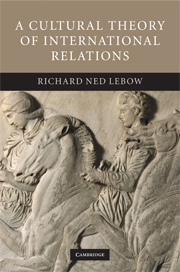Book contents
- Frontmatter
- Contents
- List of figures and tables
- Acknowledgments
- 1 Introduction
- 2 Fear, interest and honor
- 3 The spirit and its expression
- 4 The ancient world
- 5 Medieval Europe
- 6 From Sun King to Revolution
- 7 Imperialism and World War I
- 8 World War II
- 9 Hitler to Bush and beyond
- 10 General findings and conclusions
- Bibliography
- Index
- References
Bibliography
Published online by Cambridge University Press: 03 July 2009
- Frontmatter
- Contents
- List of figures and tables
- Acknowledgments
- 1 Introduction
- 2 Fear, interest and honor
- 3 The spirit and its expression
- 4 The ancient world
- 5 Medieval Europe
- 6 From Sun King to Revolution
- 7 Imperialism and World War I
- 8 World War II
- 9 Hitler to Bush and beyond
- 10 General findings and conclusions
- Bibliography
- Index
- References
- Type
- Chapter
- Information
- A Cultural Theory of International Relations , pp. 571 - 740Publisher: Cambridge University PressPrint publication year: 2008



